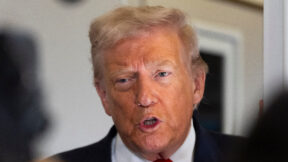‘I’ve Been in This Exact Situation in This Exact Courtroom’: CNN’s Elie Honig Explains Diddy Jury’s Partial Verdict
CNN senior legal analyst Elie Honig reacted to Tuesday’s news that the federal jury in the trial of Sean “Diddy” Combs had reached a verdict in four of the five counts against him, but were sent back by the judge to continue deliberating on the last one, noting that he had “been in this exact situation in this exact courtroom” back when he was a federal prosecutor.
Combs is facing five total felony counts: one of racketeering conspiracy, two counts of sex trafficking, and two counts of transportation to engage in prostitution.
Combs’s trial in the U.S. District Court for the Southern District of New York began on May 5, with District Judge Arun Subramanian presiding.
Prosecutors have argued Combs masterminded a decades-long criminal enterprise that abused, threatened, and coerced his victims, including Cassie Ventura, his ex-girlfriend whom he was seen violently assaulting in a now-infamous hotel surveillance video from March 2016, and another ex-girlfriend, pseudonymously referred to as “Jane” during the trial.
Legal experts have said that Combs could spend the rest of his life behind bars if he is convicted, due to the serious nature of the charges against him, the alleged long time period during which the alleged crimes occurred, and total number of incidents involved. He pleaded not guilty to the charges and his legal team, led by attorney Marc Agnifilo, argued throughout the trial that any sexual encounters were legal and consensual.
Count 1, for racketeering conspiracy, is the one where the jury has yet to reach a verdict and is widely viewed by legal commentators as the most complex and hardest for prosecutors to establish in this case.
Honig, a former assistant U.S. Attorney for the Southern District of New York and former prosecutor with the New Jersey Attorney General’s Office, spoke to The Lead anchor Jake Tapper Tuesday to discuss the implications of the partial verdict.
“There is a verdict. There are four verdicts. It’s just they’re not letting us know what they are,” said Tapper, asking Honig what he thought would happen tomorrow, if the jury would be able to reach a verdict.
“OK, Jake, I’ve been in this exact situation, in this exact courtroom, where you have a partial verdict,” said Honig, and “you don’t know what it is.”
Even though the prosecutors did not know what the jury had decided on counts two through five, Honig added, it was still “good news” because “the hung jury is always a nightmare for prosecutors — it’s basically a win for the defense.”
Honig offered his analysis of what might happen next:
The other thing, if we look at the wording of the note that came out, it tells us that there are multiple jurors — on either side, it uses the plural — of count one, the racketeering count.
Now here’s what’s going to happen tomorrow. The jury will come back in. They will resume deliberations on count one, on the racketeering count.
And one of two things will happen from there. Either A, they will come back and say, “Okay, judge, now we’ve reached a verdict on count one.” That happens sometimes, I wouldn’t say often, but sometimes, in which case we’ll have verdicts on all five counts. The jury will come out and tell us what the verdicts are on counts one through five.
The other option, which is slightly more common in my experience, is the jury will come back at some point tomorrow and say, “Judge, you know, we tried again. We listened to your instruction. We kept open minds. We debated it three more hours, four more hours, and we’re still stuck.”
And at that point, what the judge is likely to do and has the power to do, is say, “Fine, come in. I’m going to take your verdicts on counts two through five, and we’re going to declare count one, a hung jury, a mistrial.”
So that’s what we’re looking for tomorrow.
Later in the show, Tapper asked Honig to elaborate about how the jury’s divide on the racketeering charge might play out.
TAPPER: Elie, tell me if I’m off base here, but it seems to me, if we know from what the jury says — quote, “we have jurors with unpersuadable opinions on both sides having to do with the racketeering charge” — it is unfathomable to me that there would be people on that jury who think he is guilty of racketeering, but do not think he’s guilty of the other four charges having to do with sex trafficking by force, fraud or coercion, or transportation to engage in prostitution.
In other words, if I am the defense attorneys, I am feeling not great right now.
HONIG: I agree with you. You’re doing logic here now. Logic doesn’t always apply to juries. We have to note that, I mean, there have been verdicts that are utterly nonsensical.
But if we are applying logical theories, what we know for sure, based on that note, is the jury is hung on count one. For now, they’re at a deadlock for count one, and they use the plural. And that tells me there’s at least multiple jurors out of 12 who think he is guilty of racketeering, multiple jurors out of 12 who think he’s not guilty of racketeering.
It is hard for me to fathom, logically, Jake, and I think this is the same point you’re making, that there are multiple jurors who basically say he is guilty of racketeering, but he’s not guilty of all the other crimes, the other sex trafficking crimes and interstate prostitution crimes.
So honestly, that would be the conversation I’d be having right now if I was in the prosecution room. I would take some heart in that. I would be encouraged by that as a prosecutor, that that suggests we might have guilty verdicts on the other counts. But again, juries are twelve human beings. They are as unpredictable and sometimes illogical as anything we know.
Watch the clips above via CNN.




